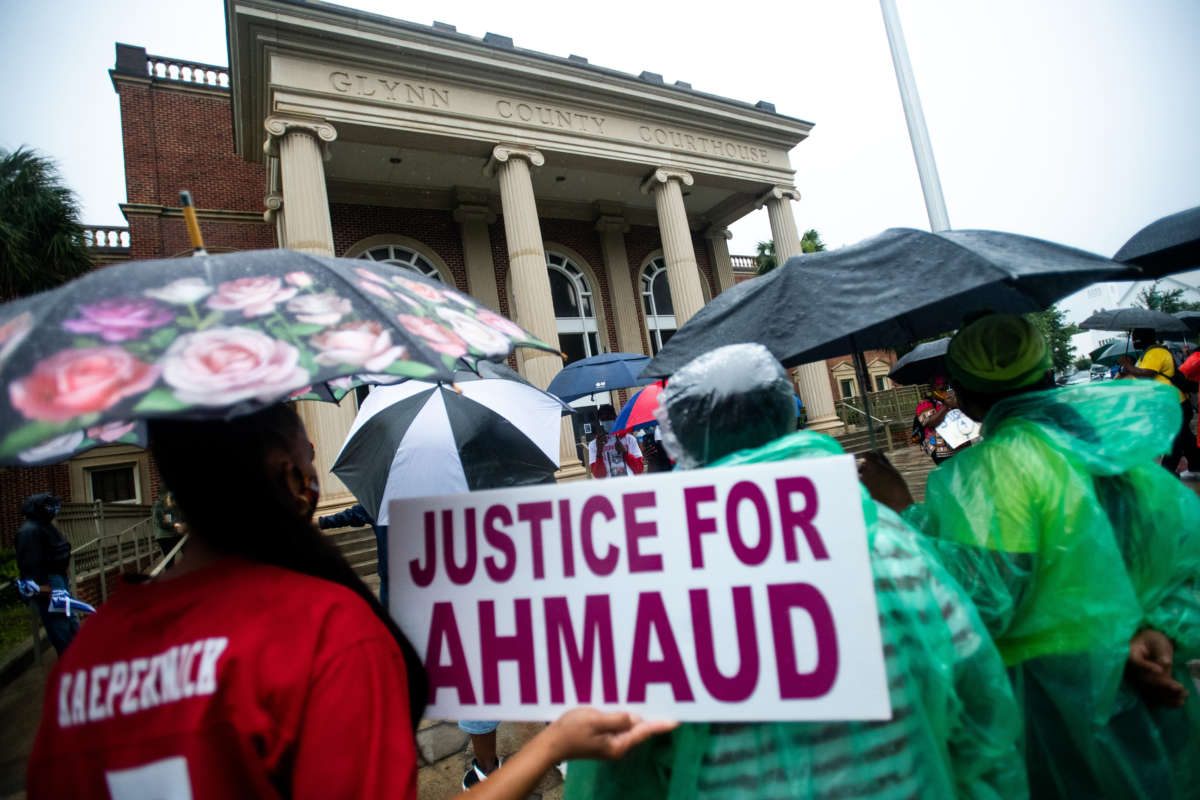Lawmakers in Georgia overwhelmingly passed new legislation that will repeal the state’s provision on citizen’s arrests, a move that came in response to public outcry over the 2020 killing of Ahmaud Arbery, a 25-year-old Black man who was shot and murdered while jogging by two white men in Georgia.
The bill passed the House by a unanimous 169-0 vote on Wednesday. Earlier this week, the Senate also approved the measure, voting 51-1 to advance it.
Gov. Brian Kemp has signaled his strong support of the bill. “I look forward to signing it into law as we continue to send a clear message that the Peach State will not tolerate sinister acts of vigilantism in our communities,” he said.
While repealing major aspects of the citizen’s arrest provision in state code, the bill leaves intact a number of ways that individuals can still detain another person under suspicion of having committed a crime, private businesses or on an individual’s personal property. Security officers, private investigators, and truck scale inspectors are also permitted to detain individuals under the new proposal.
Still, the bill states that “private actors who do not do what the law requires can be held responsible for false imprisonment” and be “civilly liable” for their actions, A Just Georgia, a nonprofit organization that bills itself as “a coalition of organizations, organizers, and lawyers, working to transform the conditions of criminalization and racialized violence,” tweeted on Wednesday.
The advancement of the bill came about in response to the 2020 killing of Ahmaud Arbery, a 25-year-old Black man who was shot and murdered near Brunswick, Georgia, while jogging. Gregory McMichael, a retired law enforcement officer, along with his son, Travis McMichael, chased Arbery down in their truck as he was out on his run.
After Travis McMichael exited the vehicle, he confronted Arbery, then shot and killed him. Both white men tried to justify chasing and shooting Arbery by saying he resembled someone who was suspected of home invasions in the area at the time. Gregory McMichael also claimed that Arbery had “violently” attacked his son, but the release of video of the killing demonstrated that did not happen.
In the months between February, when Arbery was killed, and May, when the video was published online, prosecutors in Georgia had refused to take any legal action against the McMichaels, justifying their refusal to do so on the state’s citizen’s arrest law. Following the release of the video, public outcry led to both men being charged in Arbery’s murder.
Many citizen’s arrest laws have racist histories. Georgia’s version of the law, originally passed in 1863, was intended to allow white slavers to capture Black individuals attempting to escape enslavement to join the Union Army during the Civil War. In the early 1900s, the law was also used to facilitate the lynchings and killings of Black people at the hands of white residents.
A number of organizations have celebrated the bill’s advancement. When an earlier version had passed last month, the Southern Center for Human Rights (SCHR) lauded the moves to end the outdated and racist law.
The citizen’s arrest statute was “an unnecessary law that has been used for more than 150 years to justify anti-Black violence,” Marissa Dodson, SCHR’s public policy director, said at the time.
The SCHR also tweeted in support of the more recent passage of the bill this week, but noted that the Republican-led state legislature had also recently passed a number of other oppressive bills.
Those bills, which include the expansion of mandatory cash bail and limits on local governments to reduce their police budgets, “will further harm communities most impacted by the failures of our criminal legal systems,” the organization said.
Join us in defending the truth before it’s too late
The future of independent journalism is uncertain, and the consequences of losing it are too grave to ignore. To ensure Truthout remains safe, strong, and free, we need to raise $29,000 in the next 36 hours. Every dollar raised goes directly toward the costs of producing news you can trust.
Please give what you can — because by supporting us with a tax-deductible donation, you’re not just preserving a source of news, you’re helping to safeguard what’s left of our democracy.
